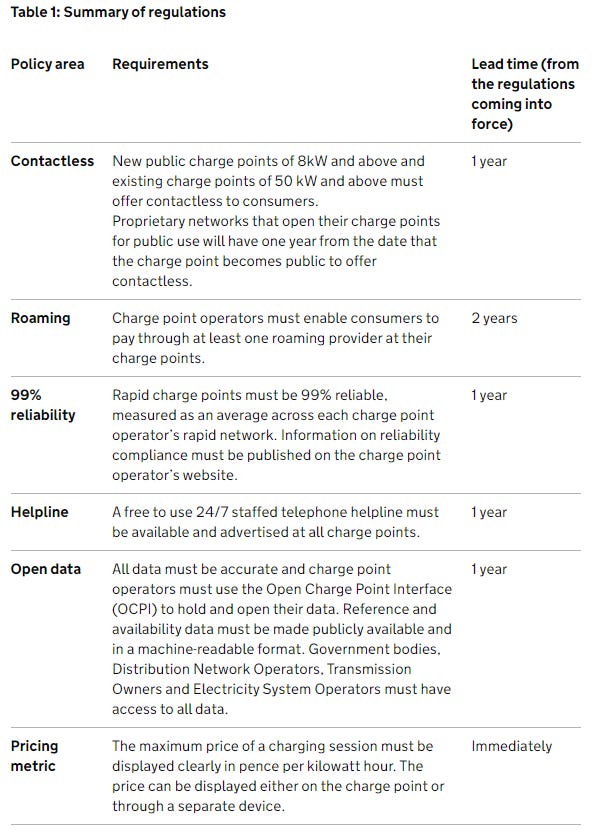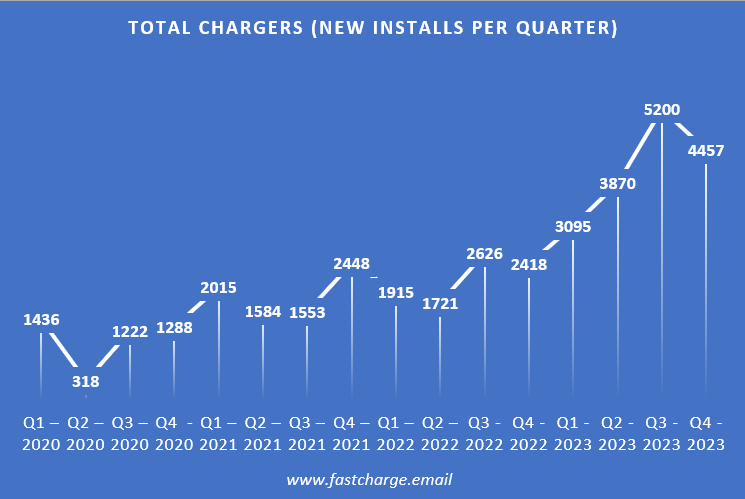New school EV chargers: DfT confirms they must follow regulations
The latest news from Britain's EV sector
Hello, I’m Tom Riley, and welcome to this bumper edition of The Fast Charge, a British EV newsletter.
Top stories in today’s newsletter… The government launched a new grant scheme for schools as a way to earn revenue (but there’s a catch), rapid chargers had their biggest quarter ever, and Arrival has now officially departed.
As ever, if you have any thoughts or feedback, do get in touch via my contact details below or reply to this email.
New grants for schools to earn extra revenue
Background: Yesterday, the Department for Transport launched a raft of new measures to help EV owners as part of its ‘Plan for Drivers’. One part of the announcement was a new grant scheme for state-funded schools, colleges and nurseries. The new grant will cover up to 75% of the cost for education institutions to buy and install EV chargers up to £2,500 per socket. Read more.
Summary: Schools often have large car parks for staff, so it makes sense that they would be included under the existing Workplace Charging Scheme. However, what caught my eye in DfT’s press release was the line: “This could also help schools to generate revenue by making their charge points available to the public.” Several education websites, like Tes and Schools Week, have already jumped on this.
But, is it a benefit? As you may recall, at the end of last year the Charge Point Regulations 2023 became law. Under these rules, charge points designated as ‘workplace’ devices – aka, those restricted for exclusive use by staff or visitors – would not have to abide by the new laws. However, those chargers that are public would need to.
These regulations include… having contactless payments on chargers faster than 8kW… delivering 99% reliability for those devices above 50kW… having a staffed 24/7 helpline… providing an annual report to ministers… and more (full regulations here).
And so… If schools do decide to take up this grant offer, and then they use their car parks to make a bit of cash on the side selling energy back to parents or other nearby residents, will they still have to abide by these regulations in their entirety? I checked with DfT yesterday, the answer is… yes, our teachers will need to.
The government believes… If a school wants to generate revenue from the chargers being installed, they will need to meet the necessary regulations. DfT says it is already clear on the GOV.UK application page, though DfT has confirmed to me that more guidance on this matter will be set out in due course. I understand where the government is coming from (and it’s good for drivers), but it seems to me that this option risks putting teachers off with a lot of homework. Though does perhaps provide new opportunities for existing operators.
Elsewhere in the announcement… DfT launched a new consultation looking at ways to speed up charge point deployment; new guidance for highway agencies delivering street works; and the government confirmed £14.2m as part of he Local EV Infrastructure scheme was delivered to five local authorities.
New EV charger stats - my top 3 findings
Background: Last Wednesday, the government published its latest quarterly statistics about the UK’s public chargers. The most recent batch covers up to 1 January 2024. You can find them here.
Summary: The new figures reveal that the UK now has 53,677 chargers publicly available – which is a 9% increase compared to October 2023, meaning 4,457 devices were added to Britain’s network up to Christmas. In terms of rapid chargers, there are now 10,118 devices offering 50kW of power or more - an increase of 1,210. Below I’ve copied my top three findings.
Firstly… The number of rapid chargers installed in Q4 was the biggest on record, with 1,379 devices over 25kW being installed. The chart below reveals the significant change. The yellow line is for all those quarterly additions above 25kW (which is the old definition of ‘rapid’ charger) whereas the red is how many of those are more than 50kW.
Secondly… As rapid chargers soared, the number of slow chargers (e.g. with speeds between 3-8kW, such as lampposts) had a lower growth. Only 1,173 such chargers were installed in Q4 - below the 1,210 rapid chargers. These devices are typically put on-street to provide ‘home charging’ for those without driveways. Rapid chargers are more expensive for networks, though easier to install with better margins - as they are mostly put on private land. Meanwhile, slower on-street chargers are much cheaper/quicker to install with lower revenues, and happen primarily on council land.
Finally… When you take a look at the regional areas and compare their growth during 2023 for charger installations, it’s fantastic to see the North West in second place - growing 57% year-on-year - closely behind London. This has been driven by huge deployments in Merseyside and Greater Manchester. See the regional comparisons below.
Top EV News…
🚗 Starting the week with great news: there have now been one million EV registrations in the UK. In January just gone, some 20,935 EVs were registered – a 21% rise year-on-year. Fleet demand for EVs grew by 41.7% in January, meanwhile, private demand fell by a quarter (25.1%). This latter point is what some headlines have focused on, but they ignore the fact that most personal EVs reach homes via company car schemes – and as I understand it the stats do not separate these. Read more.
👑 More good news, as the House of Lords this morning published a largely supportive report calling for the country’s EV strategy to get a ‘rapid recharge’. Baroness Parminter said: “The evidence we received shows the Government must do more – and quickly – to get people to adopt EVs. If it fails to heed our recommendations the UK won’t reap the significant benefits of better air quality and will lag in the slow lane for tackling climate change.” Read more.
🚚 The British EV start-up Arrival, once valued at £9bn, last night was placed into administration. The company has been struggling for more than a year, and last Summer it seemed to be exploring every method possible to secure new funding. Alas, last week the Nasdaq exchange – where in 2021 Arrival had the biggest IPO ever for a UK company – announced the firm would be delisted. If you are curious as to how Arrival drove itself to this point, please read my feature here (or watch my TikTok doc). Read more.
🤑 After much back and forth, it seems Labour is finally ditching its £28bn green spending pledge. Labour has encountered significant questioning about this for weeks, with no shadow cabinet member giving clear answers. Party sources have said Labour would keep the core mission of the investment, and perhaps tie it more closely to outcomes. Read more.
⛽ Great news as MFG last week agreed to a £2.5bn deal to acquire 337 Morrisons petrol forecourts, plus 400 associated sites so that it can continue to grow its ultra-rapid charging network. Read more.
👩💼 Talking of charging networks, the EV association ChargeUK is on the hunt for a permanent CEO. I’m told this position would work to the ChargeUK board and Chair. If you know someone who might be a fit for this, I encourage you to reach out to ChargeUK.
📊 Last Thursday, the consumer publication Which? shared critical survey results about charging experience. Which?’s survey suggested a high degree of dissatisfaction with charging in the UK, including that 73% had come across broken chargers. James Court, Chief Executive of EVA England, commented: “Over 90% of EV drivers would never go back to petrol or diesel, and charging in the UK is getting better all the time.” Though acknowledged: “Although the vast majority of EV drivers have no issues with charging, it is clear there is still room for improvement to the current infrastructure.”
💳 I recently wrote about how networks were racing to secure the best chargers. It seems at Rugby Services, Gridserve is increasing the amount it pre-authorises on cards from £35 to £40. Meanwhile, for all their other sites the money Gridserve holds is only £1. Why? Well, Gridserve has seemingly blamed Tritium, who made their Rugby chargers, suggesting the payment system is different from ABB, which they use at other sites. See thread.
💷 British Gas has launched an EV tariff for home chargers that goes down to 4p per kWh – which means drivers could save up to £298 a year. Read more.
⚠️ On the back of last week’s news about rising insurance costs for EVs, there’s an interesting read in Insurance Times – I read all the fun stuff – about how some insurers are worried about the EV transition (and possible misalignment with government). See here.
🚙 More than 16,000 people have signed up to buy an electric Range Rover, JLR revealed last week. It is only a waiting list but, given it only opened in December, is a strong response. Read more.
🔌 Even though the number of EV chargers is increasing everywhere, it seems the same can’t be said for car dealerships. A survey by MotoVise found that, as EV test drives become more popular, many dealers now had more EV ‘demonstrators’ than chargers on site – which is limiting their ability to showcase them. Read more.
🪫 Solid-state batteries are a technology that promises a lot for future EVs but is still very much in development. The Guardian has an in-depth look at the race to create them. Read more.
👋 Last week Volvo announced it will no longer fund Polestar. Volvo owns about 48% of Polestar, but many analysts said it was becoming a drain on its resources. As such, Geely – the Chinese carmaker who owns Volvo – will take on responsibility for it. Read more.
🚘 Speaking of Polestar, they recently revealed their SUV model, which many car journalists have started to publish reviews and walkarounds on. The most interesting thing though about the Polestar 4… it’s the first car without a rear window (though an argument could be made that the Lamborghini Countach didn’t). Instead, it uses an HD camera. Learn more.
🧾 The Mayor of London, Sadiq Khan, is said to be monitoring the effectiveness of an ‘SUV tax’ in Paris. The tax in question is going to triple levies for large cars in the French capital. Read more.
💸 Tesla CEO Elon Musk was refused a $56bn bonus payment last week by a Judge in Delaware – following a shareholder who started a legal challenge. In response, Musk is trying to relocate Tesla to Texas. The FT has a great explainer. Read more (paywall).
📈 One for the EV nerd diary… the government will publish its latest quarterly statistics for charge points funded by grants on 29 February. See here.
🚲 Finally, DfT recently published new guidance on buying, storing, and charging ebikes and escooters. It comes after several fires of faulty equipment. Read more.
By Tom Riley | Check my Linktree for LinkedIn, TikTok and Twitter





